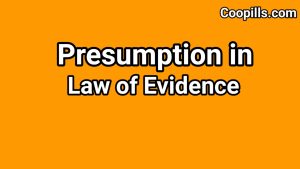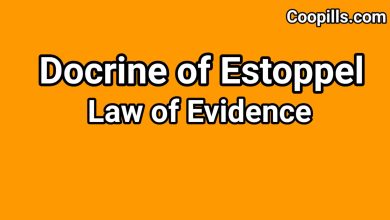Presumption:law of evidence.
In this article we shall be looking at presumption in law.

Table of Contents
What is Presumption
A presumption means a conclusion that can be inferred from the existence of certain facts; it is therefore regarded as a substitute to evidence.
Types of presumption
a. Rebuttable presumptions
b. Irrebuttable presumptions
Black’s law Dictionary (6th ed) at page 1267 describes Rebuttable presumption as specie of legal presumption which holds good until evidence contrary to it is introduced.
Rebuttable presumption provides a prima facie case which shifts to the accused or defendant the burden to contradict or rebut the fact presumed.
Classification of presumption
a. Presumption of law
b. Presumption of fact.
The use of the word ‘may’ can be used to refer to presumption of law.
Difference between presumption of law and a presumption of facts
They are five differences between presumption of law and presumption of fact:
a. Presumptions of law are provided for by the law; but presumption of facts are provided for by logical reasoning.
b. A presumption of law may be rebuttable or not rebuttable; but all presumptions of fact are rebuttable.
c. The facts that lead to presumption of law are defined and uniform; but the facts that lead to presumption of fact depend on the circumstances of each case, they fluctuate.
d. A rebuttable presumption of law is relevant depending where the burden of proof lies; but presumption of fact do not affect the burden of proof.
e. Presumption of law are drawn by the judge; but presumptions of fact are drawn by the jury or a judge sitting alone.
Presumption of facts
Section 145 of the Act provides for the general power of the court to presume the existence of certain facts which it thinks is likely to happen in the ordinary course of events.
All presumptions of fact are rebuttable.
Presumption of law
There are two types of presumption of law:
a. Irrebuttable presumption of law
b. Rebuttable presumption of law
Irrebuttable presumption of law.
Irrebuttable Presumption of law are strictly speaking not a branch of the law of evidence rather they are rules of the various branches of law. For example, under section 30 of the criminal code there is irrebuttable presumption that a person under the age of 7 years is not criminally responsible for any act or omission committed by him.
Rebuttable presumptions of law
Rebuttable presumptions of law are conclusions which a Court must drawn from the evidence of certain premises or Facts.
The following are some rebuttable presumptions of law:
a. Presumption of Innocence: under section 36(5) of 1999 constitution, every person charged with an offence is presumed innocent until contrary is proved.
b. Presumption of marriage: where a man and woman have undergone a celebrated marriage ceremony as husband and wife, there is presumption of marriage. The leading case here is piers vs piers (1849) 2 H.L Cas. 331 where the marriage was celebrated in a private house, which is neither a church nor a marriage registry nevertheless, the presumption is applicable. Also check sec.166 of the Act.
c. Presumption of Legitimacy: under section 165 of the Act and section 84 of the matrimonial Cause Act where a child is born during the continuance of valid marriage between his mother and any man or within 280 days after its dissolution, the mother remaining unmarried, the Court shall presume that the child is the legitimate Child of the man,
and only very strong evidence can rebut this presumption.
d. Presumption of sanity: under section 27 of the criminal code every person is presumed to be of sound mind until the contrary is proved.
e. Presumption of Death: under section 164 of the Act there are two kind of presumptions:
Section 164(1) of the Act deals with the unexplained absence of a person for 7 years by thise, if any, who, if he had been alive would naturally have heard of him. Such a person is presumed dead unless the circumstances of the case are such as to account for his not being heard of without assuming his death. Section 164(3) of the Act provides that the presumption in section 164(1) relates only to fact of death not the age when the person died.
Section 164(2) of the Act deals with the issue of determining who, of two or more persons died First for the purpose of succession to property. The senior is presumed to died before the younger. This is called the doctrine of commorientes.
f. Presumption of negligence: this is the doctrine of res ipsa loquitor which means that the thing speak for itself. For example, where X is driving a car and he skid off the road to
hit a nearby building. The presumption of negligence is applied because the fact that the accident occurred is evidence of negligence: Management Enterprises Ltd vs Otusanya (1987) 2 NWLR 179.









